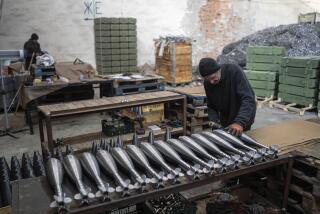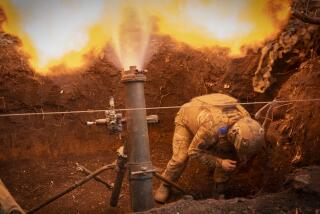U.S. to Seek Soviet Output for Civilians : Economics: American companies will be pressed to help Moscow convert defense industry to domestic production.
- Share via
MOSCOW — The Bush Administration plans to encourage U.S. companies to invest millions of dollars of their money and some of their best technology in the Soviet defense industry--to help convert it to civilian production and private enterprise.
Donald J. Atwood, deputy U.S. defense secretary, said on Tuesday after a weeklong tour of Soviet munitions plants that American business could play a key role in the reorientation of the Soviet economy, in which the military now consumes about a quarter of total production.
“Capital investment from other countries will be important to get conversion started, and started on the right foot,” Atwood said. “Technological input is equally needed at a very high level.”
The United States, which has a clear interest in the demilitarization of the Soviet economy as well as in a huge new market, would also work with Moscow to create a good investment climate to attract Western business, he said.
The Bush Administration would soon have a set of detailed recommendations for both American business people and the Kremlin, Atwood added, as part of a broad U.S. effort to foster economic development in the Soviet Union.
“There is a sincere interest on the part of industrialists, ministers and workers that there can be an orderly transition in many key (military) industries,” he said. “If we are successful, we could enhance the standard of living and create jobs.”
For decades, the Soviet Union has sacrificed consumer interests to its voracious military-industrial complex, and the conversion of the defense industry to civilian production has proceeded very slowly, remaining largely a sideline because of the lack of capital and modern equipment.
Industries targeted for development include food processing, health products and pharmaceuticals, housing, home appliances, transportation and communications.
“In some places, conversion could take place very quickly,” said Arkady Volsky, a deputy chairman of the committee administering the Soviet economy. “In Sverdlovsk (now known again as Ekaterinburg), production of a quality tape recorder can start in six months. Somewhere else, it might take much longer.”
Accompanying Atwood were representatives of major U.S. companies, including Boeing, General Electric, General Motors, Ford Motors, Upjohn and Kellogg, who in turn will explain investment opportunities to their industries on their return.
Atwood said his delegation has concluded that foreign investment is hindered by the lack of a strong currency and banking system, limited understanding of how a market economy should work and unsettled legal issues on property rights, including protection of patents and copyrights.
Meanwhile, the Soviet Union on Tuesday made three new disarmament proposals.
Soviet President Mikhail S. Gorbachev, meeting with Atwood, suggested that the United States and the Soviet Union combine efforts to destroy stocks of chemical weapons, speeding the process. The United States would need 10 years and the Soviet Union even longer to eliminate their present stockpiles, unless Moscow and Washington help each other, said Volsky, who also oversees the Soviet military-industrial complex.
Gorbachev also suggested that the laboratories doing advanced military research and development in each country work together and even go into joint production, Volsky said.
Although Volsky gave no details on either proposal, the suggestion of shared research appeared directed primarily at preventing a new arms race by ensuring that each country knows the full capability of the other and has access to the same technology. Gorbachev told Atwood, who agreed, that in several key fields, the Soviet Union was ahead of the United States, but was willing to share its knowledge.
In Vienna, Soviet negotiators announced that Moscow no longer opposes full aerial inspection of all its territory to monitor compliance with disarmament agreements, clearing the way for conclusion of an “open skies” treaty among European countries. The Soviet military has long guarded its airspace even more tightly than its land borders and refused to allow flights near its strategic weapons and other key installations.
More to Read
Sign up for Essential California
The most important California stories and recommendations in your inbox every morning.
You may occasionally receive promotional content from the Los Angeles Times.










